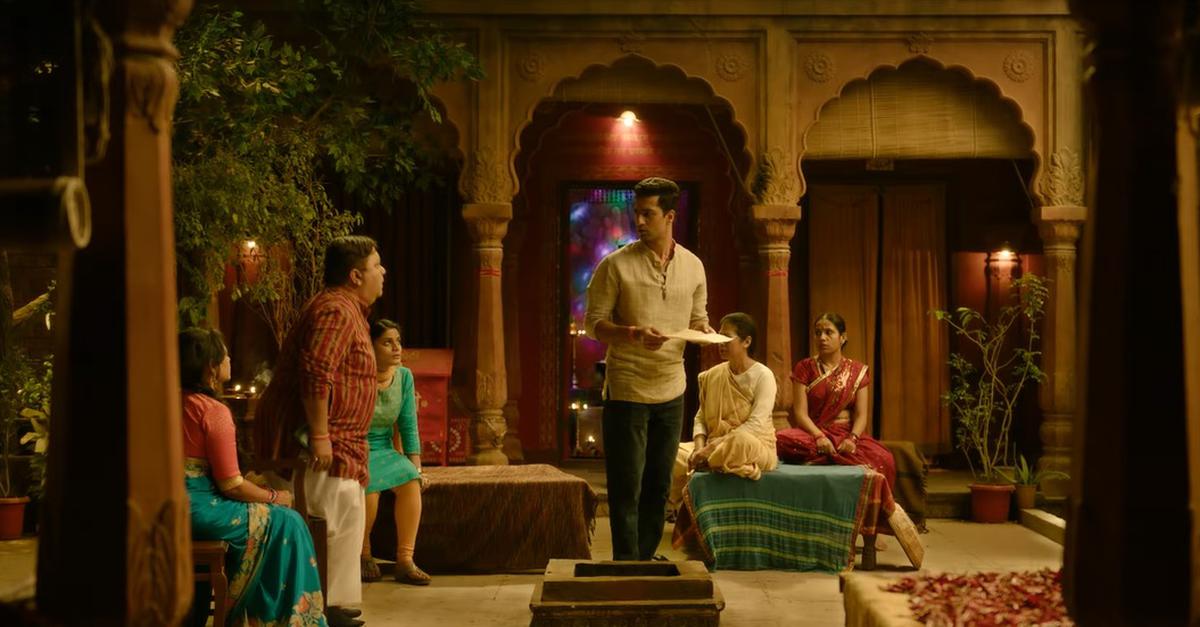CAST: Vicky Kaushal, Kumud Mishra, Manushi Chillar, Manoj Pahwa
DIRECTOR: Vijay Krishna Acharya
Several times over the course of The Great Indian Family, Ved (Vicky Kaushal) says he prefers learning practically to studying theory. This is ironic, because Vijay Krishna Acharya’s film is much better in theory than in practice. It’s built around a fertile comic provocation—Hindu priest’s son learns he’s Muslim by birth. But what it does with this is tentative and disappointing.
Ved has been a devotional singer since he was a child. He performs as Bhajan Kumar, drawing large crowds in his hometown of Balrampur and offering extra value to those engaging his father, Siyaram (Kumud Mishra), as their priest. One day, Ved reads aloud to his sister, uncle and aunts a letter addressed to his father, who’s out of town on pilgrimage. It says that the boy who came into the family in 1992—Ved—is Muslim. This throws him into crisis, which deepens when the news leaks in the neighborhood.
The escalating frenzy triggered by this revelation paints a believable, albeit relatively harmless, picture of what might unfold in a small town in Uttar Pradesh if such news were to surface. Siyaram’s clients promptly sever their connections, and digitally altered images of Ved, featuring a skullcap and darkened eyes, proliferate on social media. Protests and marches are organized, with passersby making comments like, “You don’t fit the image…” Even within Ved’s own household, a vote is cast to decide whether he should continue performing bhajans. Interestingly, this marks the second film in a fortnight to emphasize the importance of voting wisely, albeit with a more specific and focused agenda than Jawan’s vague appeal to conscience.
Nevertheless, the film stumbles in ways that reveal its shortcomings. Ved’s outing as a Muslim is portrayed as a devastating blow, yet it never seems to occur to Acharya to delve deeper into the experience of being Muslim in India in 2023. Ved rarely reflects on his own actions. In one scene played for laughs, he and his friends unjustly intimidate an innocent Muslim man, with Ved callously uttering “surgical strike” before entering the neighborhood, a joke in extremely poor taste. We later discover that this isn’t the first time he has publicly humiliated Muslim men, yet it doesn’t appear to trouble his conscience. In another ill-conceived scene, Ved dresses up as a Muslim, complete with a cap, kajal, and green attire, as a supposed threat to his family.
Acharya, who has written the screenplay and dialogue, as he has for all his films, delivers levels of depth and nuance that are considerably lower than what one would expect from a mid-budget comedy-drama.
There ought to be a rule against characters who resort to clichés like “I know I’m loud but I’m Punjabi, and it’s from the heart,” as Manushi Chhillar does here.
This film marks Acharya’s first departure from the loud action genre he’s known for since “Thugs of Hindostan” (2018). While he clearly aims to break free from previous disappointments, there are moments where he seems to miss the glitz and glamour, which could explain the occasional (and hilariously misplaced) slow-motion walks.
“The Great Indian Family” struggles to confront the challenges within its own narrative. It sanitizes the pervasive atmosphere of casual violence and distrust towards Muslims in the country, presenting it as a temporary predicament for its Hindu protagonist. Even a violent incident from the 1992 riots is transformed into a distorted advertisement for national integration. Ved’s uncle (played by Manoj Pahwa) hurls the term ‘Naxal’ at him during an argument, unrelated to Ved’s beliefs, but rather just another buzzword to toss around, much like ‘surgical strike’ or ‘ghar wapsi.’ The film even includes the loaded image of a confused young Hindu man nearly converting to Islam, not out of conviction but as an act of rebellion, only to be saved at the last moment by his virtuous pandit father. This scene exemplifies the film’s lack of control over its own material, making it susceptible to misinterpretation as part of a hateful propaganda film with just minor adjustments.
In Theaters







